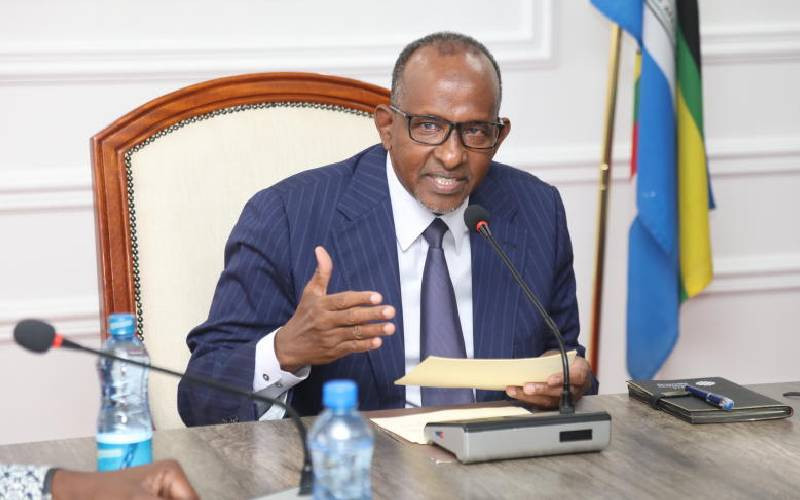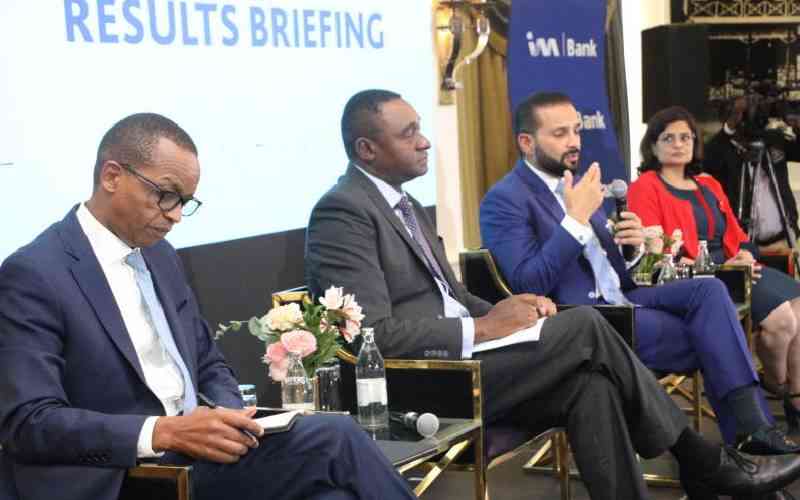
Health Cabinet Secretary Aden Duale during the inauguration of the benefits package and tarrifs advisory panel at Afya House, Nairobi, on May 26, 2025. [Wilberforce Okwiri, Standard]
When Moses Kuria, a former CS in the Kenya Kwanza government and until recently a presidential adviser, warns that the administration has embarked on an anti-Kikuyu campaign, we must pause and listen carefully. In recent weeks, we have heard reckless statements from leaders like William Kamket, Jackson Mandago, and Aden Duale, all suggesting that a certain community considers itself superior, a deliberate attempt to resuscitate the ghosts of negative ethnicity as a political strategy.
This is not new in Kenyan politics. Whenever leaders run out of ideas, they reach for the oldest trick in the book - ethnic mobilisation. It is easy, it is cheap, and it has proven to be dangerously effective in the past. But as Kuria rightly points out, there is a point beyond which a people pushed to the wall may respond in unintended ways. No nation can survive sustained politics of collective condemnation, vilification, and scapegoating.
Let us be very clear: Condemning an entire community because of the actions or perceived actions of a few individuals is not only unjust, it is reckless. If Kamket, Mandago, or Duale believe the Kikuyu people stole their goat, let them demand compensation from the thief. Not smear the entire mountain. Collective punishment has no place in a democracy.
The irony is that while leaders fan the flames of division, ordinary Kenyans across communities face the same hardships. Hunger does not care about ethnicity. Joblessness does not respect tribe. Poverty does not ask whether you are Kikuyu, Kalenjin, Luo, Luhya, Somali, or Kamba. The pain is the same, and it is deepest among the youth.
Instead of discussing how to create sustainable jobs, revive industries, and stabilise the economy, our leaders are busy weaponising identity. They appear to have concluded that they cannot win re-election in 2027 on the basis of performance, and so are resorting to fear-mongering and scapegoating. This is a dangerous gamble. History teaches us that once ethnic fires are lit, they rarely burn under control. They consume more than the instigators bargain for.
Kenya has been here before. We remember the bitter ethnic clashes of the 1990s and the post-election violence of 2007–2008. We know what happens when leaders whip up communities against each other. Lives are lost, families are displaced, and the nation is scarred for decades. It is shocking that after all the lessons, after a Constitution that promised us a break from the past, we still hear senior leaders openly playing this game.
The real crisis is economic. Kenya Kwanza came to power promising a bottom-up economic transformation that would put money in the pockets of hustlers. Instead, what we see is a country sinking deeper into debt, businesses shutting down, investors fleeing, and young people sinking into despair.
These are the conversations leaders should be having. How to make the economy work for all Kenyans. How to ease the suffocating tax burden. How to reform education so that skills translate into real opportunities. How to protect farmers from exploitation by cartels. How to ensure that boda boda riders, the small-scale traders, and the casual workers actually feel the weight of government working for them rather than against them.
Yet instead of solutions, what do we get? A new wave of ethnic scapegoating. It is as though the ruling elite believe that if they keep Kenyans fighting among themselves, no one will notice the collapsing economy, the joblessness, and the hunger. This is politics at its most cynical.
But here is the truth: Young people are watching, and they are not fooled. Across Kenya, from the mountain to the lake, from the rift to the coast, the youth understand that their enemy is not their neighbour’s tribe. Their enemy is poverty. Their enemy is bad leadership. Their enemy is corruption, impunity, and incompetence.
This is the conversation we must force upon the political class. We must reject the temptation to be divided by ethnicity. We must refuse the narrative that blames entire communities for the failures of individuals. And we must demand that leaders tell us how they will create jobs, reduce the cost of living, and secure our future.
Gitile is a professor of management and leadership and a former NCIC commissioner






